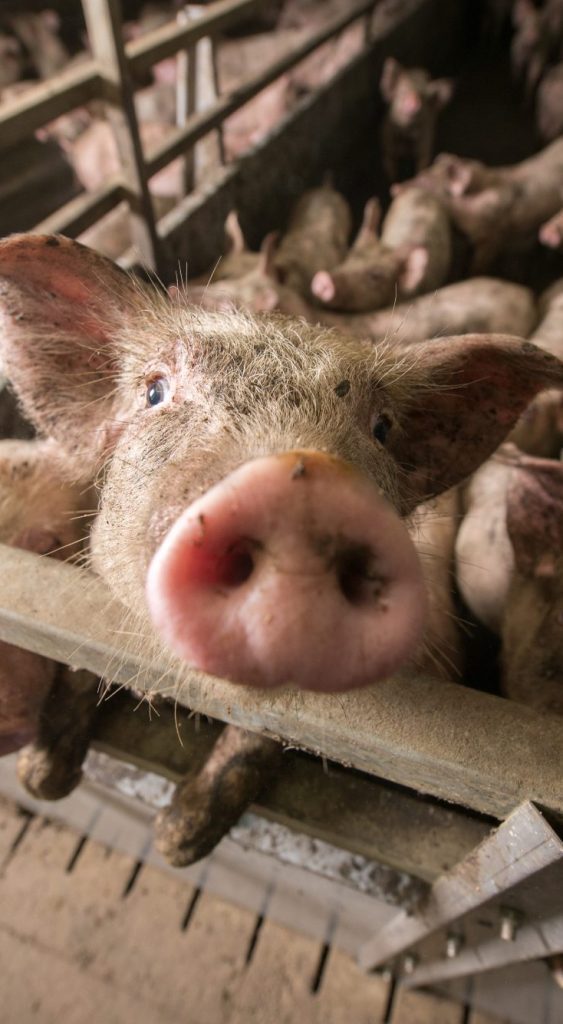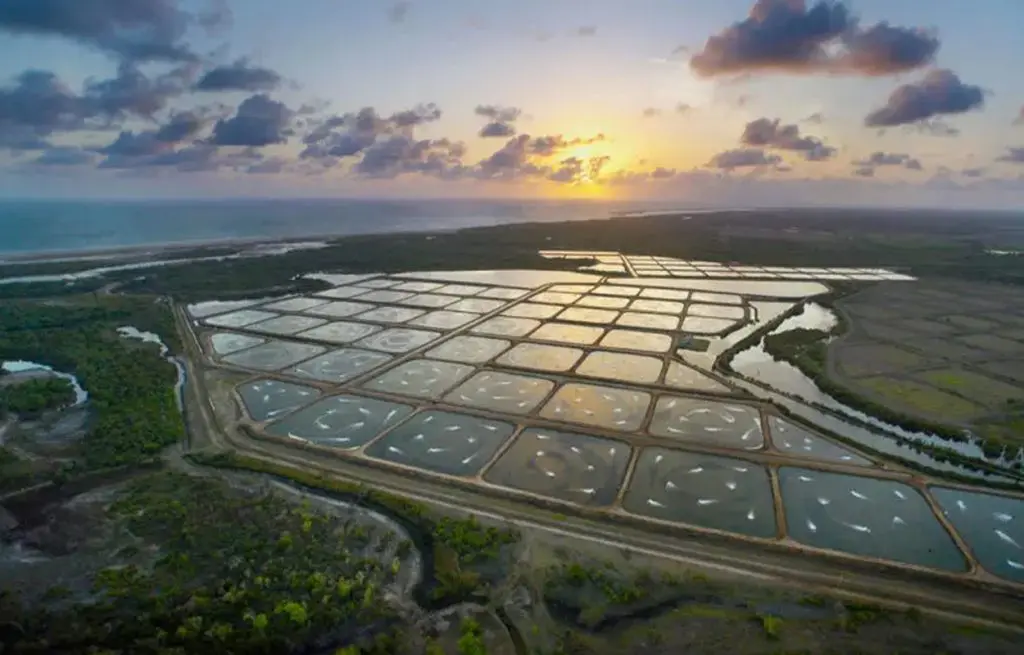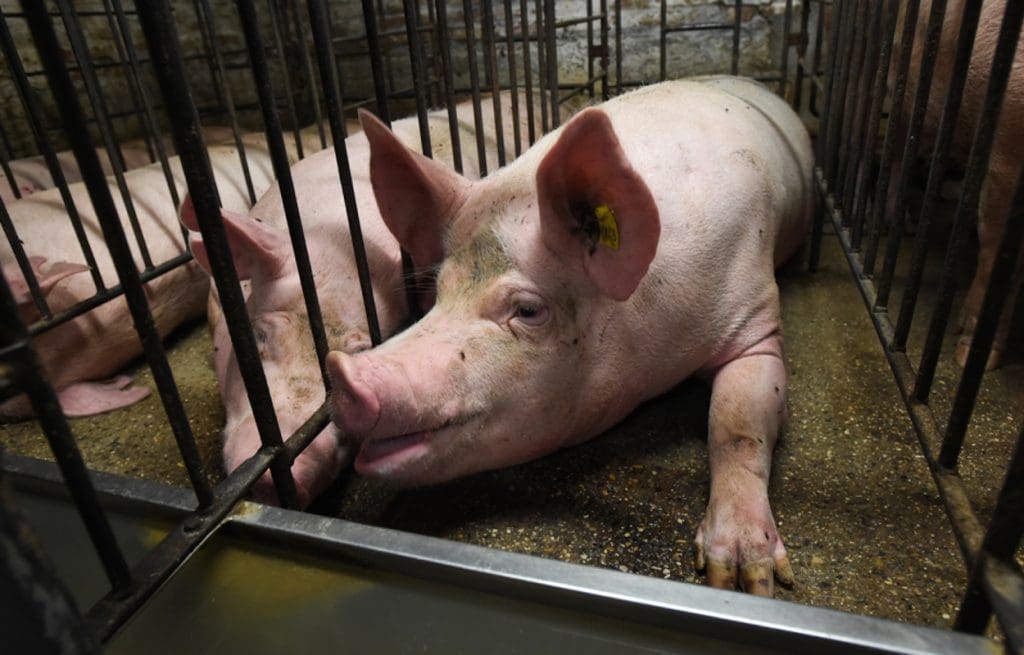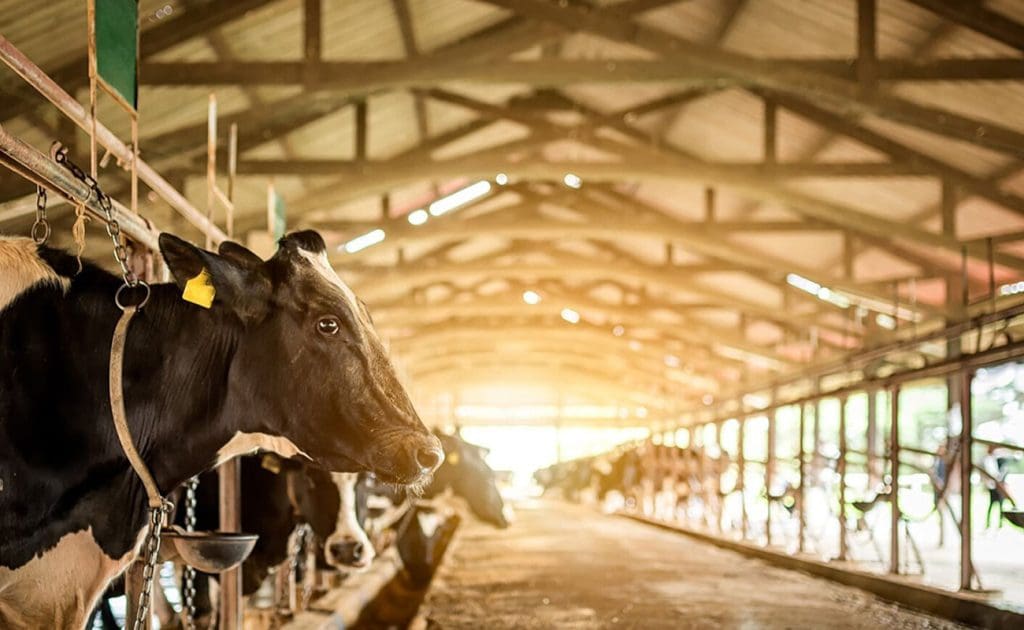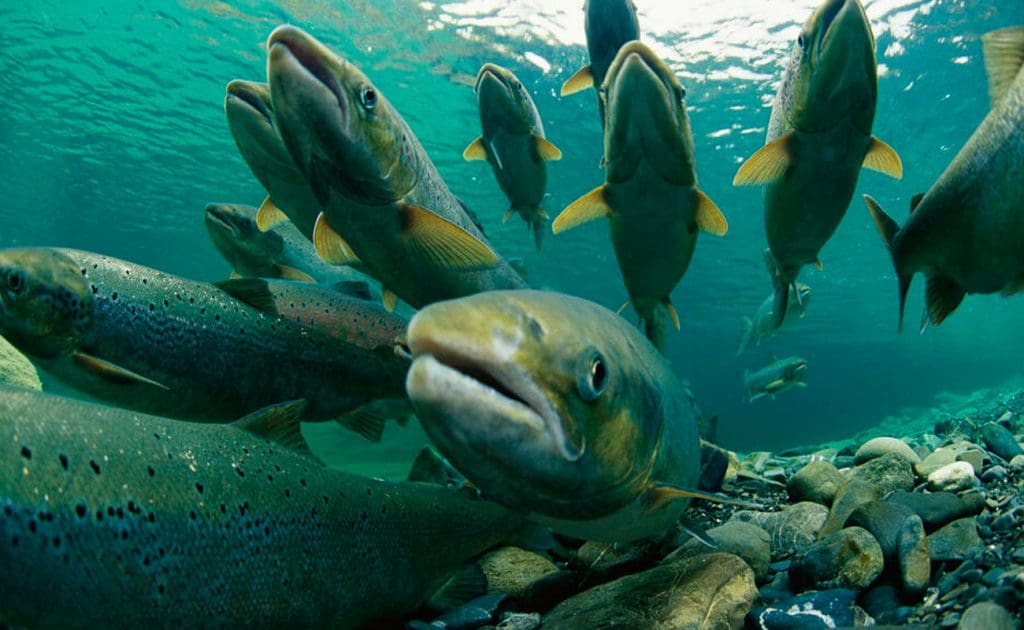
15 000 литров
Вода требуется для производства всего одного килограмма говядины-резкого примера того, как животное сельское хозяйство потребляет одну треть пресной воды мира. [1]

80%
Обезлесения Amazon вызвано ранчо скота - виновника номер один за разрушением крупнейшего в мире тропического леса. [2]

77%
Глобальных сельскохозяйственных земель используется для скота и корма для животных, но он обеспечивает всего 18% калорий мира и 37% своего белка. [3]

ПГ
Промышленное сельское хозяйство производит больше парниковых газов, чем весь глобальный транспортный сектор вместе взятый. [4]

92 миллиарда
Из мировых земельных животных убиты за еду каждый год - и 99% из них терпят жизнь на фабричных фермах. [5]

400+ типов
из токсичных газов и более 300 миллионов тонн навоза генерируются фабричными фермами, отравляя наш воздух и воду. [6]

1048 млн тонн
зерна питается скотом ежегодно - достаточно, чтобы прекратить глобальный голод несколько раз. [7]

37%
Из выбросов метана поступают из сельского хозяйства животных - парникового газа в 80 раз более мощного, чем Co₂, приводя к сбою климата. [8]

80%
антибиотиков во всем мире используются на фабричных животных, питающих устойчивость к антибиотикам. [9]

От 1 до 2,8 триллиона
Морские животные ежегодно убивают рыболовством и аквакультурой - большинство даже не учитываются в статистике сельского хозяйства животных. [10]

60%
Глобальной потери биоразнообразия связана с производством продуктов питания - ведущим водителем животного сельского хозяйства. [11]

75%
глобальных сельскохозяйственных земель могут быть освобождены, если мир принял растительные диеты-разблокируя область размером с Соединенных Штатов, Китая и Европейского Союза вместе взятых. [12]

Что мы делаем
Лучшее, что мы можем сделать, это изменить способ, которым мы едим. Растительная диета является более сострадательным выбором как для нашей планеты, так и для разнообразных видов, с которыми мы сосуществоваем.

Спасите землю
Сельское хозяйство животного является основной причиной потери биоразнообразия и вымирания видов во всем мире, представляя серьезную угрозу для наших экосистемы.

Закончить их страдания
Фабричное сельское хозяйство в значительной степени зависит от потребительского спроса на продукты с мясом и животными. Каждая растительная еда способствует освобождению животных от систем жестокости и эксплуатации.

Процветать на растениях
Растительные продукты не только ароматны, но и богаты необходимыми витаминами и минералами, которые повышают энергию и способствуют общему благополучию. Принятие богатой растениями диеты является эффективной стратегией предотвращения хронических заболеваний и поддержки долгосрочного здоровья.
Где животные страдают в тишине, мы становимся их голосом.
Везде, где животные пострадали, или их голоса остаются неслыханными, мы вступаем, чтобы противостоять жестокости и сострадания чемпиона. Мы неустанно работаем над тем, чтобы выявлять несправедливость, вводить длительные изменения и защищать животных везде, где их благополучие находится под угрозой.
Кризис
Правда, стоящая за нашей продовольственной промышленностью
Мясная промышленность
Животные убиты для мяса
Животные убиты за мясо, начинают страдать в тот день, когда они родились. Мясная промышленность связана с некоторыми из самых тяжелых и бесчеловечных методов лечения.

Коровы
Родившись в страданиях, коровы терпят страх, изоляцию и жестокие процедуры, такие как удаление рога и кастрация - задолго до начала убоя.

Свиньи
Свиньи, более умные, чем собаки, проводят свою жизнь на тесных, без окон. Женщины -свиньи страдают больше всего - с удовольствием пропитывались и ограничивались ящиками, настолько маленькими, что даже не могут повернуться, чтобы утешить своих молодых.

Куры
Цыплята терпят худшее из фабричного сельского хозяйства. Упакованные в грязные сараи тысячами, они выращены, чтобы расти так быстро, что их тела не могут справиться, что увлечение болезненными деформациями и ранней смертью. Большинство из них убиты всего в шесть недель.

Ягнят
Ягнят терпит болезненные уветки и разрываются из их матерей всего за несколько дней после рождения - все ради мяса. Их страдания начинаются слишком рано и заканчиваются слишком рано.

Кролики
Кролики страдают от жестоких убийств без юридической защиты - многие избиты, не обращаются с употреблением, и их горло прорезало, пока все еще сознательно. Их тихая агония часто остается невидимой.

Индюки
Каждый год миллионы индеек сталкиваются с жестокими смертью, многие из которых умирают от стресса во время транспорта или даже варят живыми в бойнях. Несмотря на их интеллект и сильные семейные узы, они страдают тихо и в большом количестве.
За пределами жестокости
Мясная промышленность наносит вред как планете, так и наше здоровье.
Влияние мяса на окружающую среду
Повышение животных для пищи потребляет огромное количество земли, воды, энергии и причинения серьезным вреда в окружающей среде. ФАО ООН говорит, что снижение потребления продуктов животных жизненно важно для борьбы с изменением климата, поскольку фермерское хозяйство скота составляет почти 15% глобальных выбросов парниковых газов. Заводские фермы также тратят обширные водные ресурсы - на корм, уборку и питье - при загрязнении более 35 000 миль водных путей в США
Риск для здоровья
Употребление продуктов животного происхождения увеличивает риск серьезных проблем со здоровьем. ВОЗ классифицирует обработанное мясо как канцероген, повышая риск развития рака толстой кишки и прямой кишки на 18%. Продукты животного происхождения с высоким содержанием насыщенных жиров, связанных с сердечными заболеваниями, инсультами, диабетом и раком - более высокие причины смерти в исследованиях США показывают, что вегетарианцы живут дольше; Одно исследование показало, что они были на 12% реже умирать в течение шести лет по сравнению с пожирателями мяса.
Молочная промышленность
Dairy's Dark Secret
За каждым стаканом молока находится цикл страданий - у коров неоднократно пропитывается ковы, только чтобы их телята забрали, чтобы их молоко можно было собирать для людей.
Сломанные семьи
На молочных фермах матери плачут о своих телятах, когда их забрали, поэтому молоко, предназначенное для них, может быть в бутылках для нас.
Ограничен в одиночестве
Телята, сорванные от своих матерей, проводят раннюю жизнь в холодной изоляции. Их мамы остаются привязанными в тесных киосках, проживающих годах безмолвных страданий - просто производить молоко, никогда не предназначенное для нас.
Болезненные уветки
От жгучей боли от брендинга до сырой агонии обезвоживания и стыковки хвоста - эти насильственные процедуры выполняются без анестезии, оставляя коровы шрамы, испуганные и сломанные.
Жестоко убит
Коровы, разведенные для молочного, лицо жестокого конца, забитые слишком молодыми, когда они больше не производят молоко. Многие терпят болезненные путешествия и остаются в сознании во время убоя, их страдания скрыты за стенами промышленности.
За пределами жестокости
Жестокие молочные продукты вредят окружающей среде и наше здоровье.
Экологическая стоимость молочных продуктов
Молочное сельское хозяйство выделяет большие количества метана, оксида азота и углекислого газа - позиционных парниковых газов, которые наносят атмосферу. Это также управляет обезлесением, превращая естественные места обитания в сельскохозяйственные угодья и загрязняет местные источники воды посредством неправильной обработки навоза и удобрений.
Риск для здоровья
Потребление молочных продуктов связано с более высокими рисками серьезных проблем со здоровьем, включая рак молочной железы и простаты, из-за высоких уровней фактора роста в молоке. Хотя кальций необходим для сильных костей, молочные продукты не единственный или лучший источник; Листовая зелень и укрепленные напитки на растительной основе предлагают более здоровые альтернативы без жестокости.
Яичная промышленность
Жизнь курицы в клетке
Куры - это социальные животные, которые наслаждаются добычей и уходом за своими семьями, но они проводят до двух лет, тесно связанных в крошечных клетках, неспособные распространять свои крылья или вести себя естественно.
34 часа страданий: реальная стоимость яйца
Мужской цыпленок отбрасывает
Мужские птенцы, неспособные откладывать яйца или расти, как мясные цыплята, считаются бесполезными яичными. Сразу после вылупления они отделены от женщин и жестоко убиты - либо задохнулись, либо зажихали живыми на промышленных машинах.
Интенсивное заключение
В США почти 75% кур втиснуты в крошечные проволочные клетки, каждый с меньшим пространством, чем лист бумаги принтера. Вынужденные стоять на твердых проводах, которые травмируют ноги, многие курицы страдают и умирают в этих клетках, иногда оставляли для разложения среди живых.
Жестокие увечий
Куры в яичной промышленности страдают от сильного стресса от крайнего заключения, что приводит к вредному поведению, таким как самоубийство и каннибализм. В результате рабочие отрезали некоторые из своих чувствительных клювов без обезболивающих.
За пределами жестокости
Яичная отрасль наносит вред как нашему здоровью, так и окружающей среде.
Яйца и окружающая среда
Производство яиц значительно наносит ущерб окружающей среде. Каждое употребление яйца генерирует полфунта парниковых газов, включая аммиак и углекислый газ. Кроме того, большое количество пестицидов, используемых в местных водных путях и воздухе загрязняет яичное выращивание, способствуя широко распространенному повреждению окружающей среды.
Риск для здоровья
Яйца могут нести вредные бактерии сальмонеллы, даже когда они выглядят нормально, вызывая такие симптомы заболевания, как диарея, лихорадка, боль в животе, головная боль, тошнота и рвота. Яйца с фабрикой часто бывают из кур, содержащихся в плохих условиях, и могут содержать антибиотики и гормоны, которые представляют риски для здоровья. Кроме того, высокое содержание холестерина в яйцах может способствовать сердечным и сосудистым проблемам у некоторых людей.
Рыболовная промышленность
Смертельная рыбная промышленность
Рыба чувствует боль и заслуживает защиты, но не имеет законных прав на сельское хозяйство или рыбалку. Несмотря на их социальную природу и способность чувствовать боль, с ними рассматриваются как простые товары.
Фабричные рыбные фермы
Большинство рыб, потребляемых сегодня, выращиваются в многолюдных аквафармах на основе внутренних или океана, ограничивая всю свою жизнь в загрязненных водах высоким уровнем аммиака и нитратов. Эти суровые условия приводят к частым заражениям паразитов, которые атакуют их жабры, органы и кровь, а также широко распространенные бактериальные инфекции.
Промышленная рыбалка
Коммерческая рыбалка вызывает огромные страдания животных, убивая почти триллион рыб ежегодно по всему миру. Массивные корабли используют длинные линии - до 50 миль с сотнями тысяч крючков с приманкой - и жабры, которые могут простираться от 300 до семи миль. Рыба слепо плавает в этих сетях, часто задыхаясь или кровоточив до смерти.
Жестокая бойня
Без юридической защиты рыба страдает от ужасных смертей в американских бойнях. Снив из воды, они беспомощно вздохнули, когда их жабры рухнут, медленно задыхаясь от агонии. Большая рыба - плуна, рыба -меч - жестоко забиты, часто ранены, но все еще сознательны, вынуждены выдержать повторные удары перед смертью. Эта неустанная жестокость остается скрытой под поверхностью.
За пределами жестокости
Рыночная промышленность опустошает нашу планету и наносит ущерб нашему здоровью.
Рыбалка и окружающая среда
Промышленная рыбалка и рыбоводство наносят ущерб окружающей среде. Фабричные рыбные фермы загрязняют воду токсическими уровнями аммиака, нитратов и паразитов, что приводит к широкому повреждению. Крупные коммерческие рыболовные сосуды очистит дно океана, уничтожая среду обитания и отбрасывая до 40% их улова в качестве прихода, усугубляя экологическое воздействие.
Риск для здоровья
Употребление рыбы и морепродуктов несет в себе риски для здоровья. Многие виды, такие как тунец, рыба -меч, акула и скумбрия, содержат высокий уровень ртути, что может нанести вред развивающимся нервным системам плодов и маленьких детей. Рыба также может быть загрязнена токсичными химическими веществами, такими как диоксины и ПХБ, связанные с раком и репродуктивными проблемами. Кроме того, исследования показывают, что потребители рыбы могут ежегодно принимать тысячи крошечных пластиковых частиц, что может привести к воспалению и повреждению мышц с течением времени.
200 животных.
Вот сколько жизней может сэкономить каждый год, став веганом.
В то же время, если зерно, используемое для кормления скота, вместо этого использовалось для кормления людей, оно могло бы обеспечивать пищу до 3,5 миллиардов человек в год.
Критический шаг в решении глобального голода.


Готовы изменить ситуацию?
Вы здесь, потому что вам небезразличны люди, животные и планета.

Почему стоит выбрать растительный образ жизни?
Узнайте о весомых причинах перехода на растительное питание — от улучшения здоровья до более благоприятной планеты. Узнайте, насколько важен ваш выбор продуктов питания.

Ваше руководство по переходу на растительный образ жизни
Откройте для себя простые шаги, умные советы и полезные ресурсы, которые помогут вам с уверенностью и легкостью начать свой путь к растительной жизни.
Для людей
Фабричное сельское хозяйство представляет собой огромную опасность для здоровья людей для людей, и это является результатом небрежной и грязной деятельности. Одной из наиболее серьезных проблем является чрезмерное использование антибиотиков в домашнем скоте, что широко распространено на этих фабриках, чтобы отразить заболевания в переполненности и стрессовых условиях. Это интенсивное использование этого приводит к образованию бактерий, которые устойчивы к антибиотикам, которые затем передаются людям от прямого контакта с инфицированным, потреблением инфицированных продуктов или источников окружающей среды, таких как вода и почва. Распространение этих «супербогов» представляет собой серьезную угрозу для здоровья мира, поскольку он может сделать инфекции, которые легко лечились в прошлом, устойчивыми к лекарствам или событиям неизлечимым. Кроме того, заводские фермы также создают идеальный климат для появления и распространения зоонозных патогенов - пользования, которые можно приобрести и передавать от животных на человека. Такие микробы, как Salmonella, E. coli и Campylobacter, являются жителями грязных фабричных ферм, чьи распространение увеличивает вероятность их существования в мясе, яйцах и молочных продуктах, приводящих к болезням и вспышкам. Помимо микробных рисков, продукты животного происхождения заводской фермы часто богаты насыщенными жирами и холестерином, вызывая несколько хронических заболеваний, таких как ожирение, сердечно-сосудистые заболевания и диабет 2 типа. Кроме того, чрезмерное использование гормонов роста в домашнем скоте вызвало обеспокоенность по поводу возможных гормональных дисбалансов, а также долгосрочных воздействий людей на здоровье людей, которые потребляют эти продукты. Загрязнение окружающей среды, вызванное фабричным сельским хозяйством, также косвенно влияет на здоровье соседних сообществ, поскольку отходы животных могут проникать в питьевую воду с опасными нитратами и бактериями, что приводит к проблемам желудочно -кишечного тракта и другим проблемам со здоровьем. До этого эти опасности подчеркивают необходимость немедленных изменений в том, как производится продукты питания для защиты общественного здравоохранения, а также поощрения более безопасных и устойчивых сельскохозяйственных методов.
В современном обществе наблюдается значительный рост числа людей, переходящих на растительную диету. Будь то...
По мере того, как растет понимание негативного воздействия наших повседневных потребительских привычек на окружающую среду и благополучие животных, этические...
Когда дело доходит до выбора диеты, существует множество вариантов. Однако в последние годы...
Морепродукты уже давно являются основным продуктом питания во многих культурах, обеспечивая источник пропитания и экономической стабильности для прибрежных сообществ.
В современном мире устойчивое развитие стало насущной проблемой, требующей нашего немедленного внимания. Учитывая постоянно растущий рост населения планеты и...
В мире контроля веса наблюдается постоянный приток новых диет, добавок и программ упражнений, обещающих быстрый...
Для животных
Фабричное сельское хозяйство основано на невообразимой жестокости к животным, рассматривая этих животных как простые товары, а не на разумные существа, которые могут чувствовать боль, страх и страх. Животные в этих системах хранятся в ограниченных клетках с очень небольшим количеством места для движения, что гораздо меньше для выполнения естественного поведения, такого как выпас, гнездование или общение. Задержанные состояния наносят тяжелые физические и психологические страдания, что приводит к травмам и вызывает длительные состояния хронического стресса с развитием аномального поведения, такого как агрессия или самоповреждение. Цикл непроизвольного репродуктивного лечения для матери -животных бесконечен, а потомства удаляются из матерей в течение нескольких часов после рождения, вызывая повышенный стресс как для матери, так и для молодых. Телята часто изолируют и выводят от любого социального взаимодействия и связывания со своими матерями. Болезненные процедуры, такие как стыковка хвоста, распределение, кастрация и разорение, выполняются без анестезии или смягчения боли, вызывая ненужные страдания. Отбор для максимальной продуктивности, о том, что более быстрой скорости роста у цыплят или более высоких урожаев молока у молочных коров, приводили к тяжелым состояниям здоровья, которые очень болезненны: мастит, неудачи органов, деформации костей и т. Д. Многие виды страдают за всю свою жизнь в жизни в Грязная, переполненная среда, очень подверженная болезням, без адекватной ветеринарной помощи. Когда они отрицают солнечный свет, свежий воздух и пространство, они страдают в фабрических условиях до дня бойни. Эта непрерывная жестокость повышает этические проблемы, но также подчеркивает, насколько далеки операции промышленного сельского хозяйства от любого морального обязательства относиться к животным любезно и с достоинством.
По мере того, как растет понимание негативного воздействия наших повседневных потребительских привычек на окружающую среду и благополучие животных, этические...
Когда дело доходит до выбора диеты, существует множество вариантов. Однако в последние годы...
Морепродукты уже давно являются основным продуктом питания во многих культурах, обеспечивая источник пропитания и экономической стабильности для прибрежных сообществ.
В последние годы термин «обниматель кроликов» используется для насмешки и унижения тех, кто выступает за права животных...
Мясная и молочная промышленность уже давно является предметом споров и вызывает споры о ее влиянии на окружающую среду, животных...
Океан покрывает более 70% поверхности Земли и является средой обитания разнообразных водных организмов. В...
Для планеты
Заводское сельское хозяйство создает монументальный объем риска для планеты и окружающей среды, становясь основным игроком в ухудшении экологии и изменения климата. Среди наиболее эффективных экологических последствий интенсивного сельского хозяйства являются выбросы парниковых газов. Живописное хозяйство, особенно от крупного рогатого скота, производит огромное количество метана - интенсивный парниковый газ, который очень эффективно сохраняет тепло в атмосфере по сравнению с диоксидом углерода. Так что это еще один основной фактор, способствующий глобальному потеплению и обеспечению ускорения изменения климата. Во всем мире массовый очистка лесных угодий для выпаса животных или для выращивания монокультурных культур, таких как соевые бобы и кукуруза для корма для животных, представляет собой еще одну мощную сторону фабричного сельского хозяйства, вызывающего обезлесение. В дополнение к снижению способности планеты поглощать углекислый газ, разрушение лесов также нарушает экосистемы и угрожает биоразнообразию, разрушая среды обитания для бесчисленных видов. Кроме того, заводское сельское хозяйство отвлекает критические водные ресурсы, поскольку для скота необходимо так много воды, выращивание кормовых культур и утилизацию отходов. Необорная сброс отходов животных загрязняет реки, озера и подземные воды с вредными веществами, такими как нитраты, фосфаты и жизнеспособные организмы, что приводит к загрязнению воды и нересту мертвых зон в океанах, где не может существовать морская жизнь. Другая проблема-это деградация почвы из-за истощения питательных веществ, эрозии и опустынивания из-за чрезмерной эксплуатации земли для производства кормов. Кроме того, тяжелое использование пестицидов и удобрений разрушает окружающую экосистему, которая наносит вред опылителям, дикой природе и человеческим сообществам. Фабричное сельское хозяйство не только сталкивается с здоровьем на планете Земля, но и увеличивает стресс на природные ресурсы, тем самым стоит на пути экологической устойчивости. Для решения этих вопросов необходим переход к более устойчивым пищевым системам, которые включают этические соображения для благосостояния человека и животных и самой окружающей среды.
По мере того, как растет понимание негативного воздействия наших повседневных потребительских привычек на окружающую среду и благополучие животных, этические...
Когда дело доходит до выбора диеты, существует множество вариантов. Однако в последние годы...
Морепродукты уже давно являются основным продуктом питания во многих культурах, обеспечивая источник пропитания и экономической стабильности для прибрежных сообществ.
Животноводство на протяжении тысячелетий играло центральную роль в жизни человечества, обеспечивая важнейший источник продовольствия...
В современном мире устойчивое развитие стало насущной проблемой, требующей нашего немедленного внимания. Учитывая постоянно растущий рост населения планеты и...
Нам, как обществу, уже давно рекомендуется питаться сбалансированно и разнообразно для поддержания общего здоровья...
- В единстве давайте мечтаем о будущем, в котором фабричное сельское хозяйство, которое заставило животных, страдает, станет историей, о которой мы можем поговорить с улыбкой на наших лицах, где те же самые животные плачут о своих собственных страданиях, которые произошли давно и где Здоровье людей и планеты является одним из основных приоритетов всех нас. Сельское хозяйство является одним из основных способов производства нашей еды в мире; Тем не менее, система приносит некоторые плохие последствия. Например, обезболивающие животные просто невыносимы. Они живут в тесных, переполненных пространствах, что означает, что они не могут выразить свое естественное поведение и, что еще хуже, они подвергаются бесчисленным случаям мучительной боли. Сельское хозяйство животных - это не только причина, по которой животные страдают, но также на радаре появляются окружающая среда и здоровье. Чрезмерное использование антибиотиков у крупного рогатого скота способствует росту устойчивых к антибиотикам бактерий, которые представляют угрозу для здоровья человека. Животные, такие как коровы, также являются источником загрязнения в воде из -за высвобождения вредных химических веществ. С другой стороны, ввод животного сельского хозяйства посредством деятельности по вырубке лесов и изменения климата посредством массового выброса парниковых газов является проблемой.
- Наша вера находится в мире, где каждое существо, которое здесь, удостоено уважения и достоинства, и первый свет ведет, куда уходят люди. Благодаря нашему правительству, образовательным программам и стратегическим партнерским отношениям мы взяли на себя дело, чтобы рассказать правду о фабричном сельском хозяйстве, таком как очень болезненное и жестокое обращение с животными, как порабощенные животные, не имеют права и подвергаются пыткам до смерти. Наше основное внимание уделяется предоставлению образования для людей, чтобы они могли принимать мудрые решения и фактически привести к реальным изменениям. Humane Foundation -это некоммерческий институт, работающий над представлением решений многих проблем, возникающих в результате фабричного сельского хозяйства, устойчивости, благосостояния животных и здоровья человека, что позволяет людям согласовать свое поведение со своими моральными ценностями. Производя и продвигая заменители на основе растений, разрабатывая эффективную политику по защите животных и создавая сети с аналогичными организациями, мы преданно стремимся построить как сострадательную, так и устойчивую среду.
- Humane Foundation связан с общей целью - в мире, где будет 0% злоупотребления заводскими сельскохозяйственными животными. Будь то обеспокоенный потребитель, любитель животных, исследователь или политик, быть нашим гостем в движении для разнообразия. Как и команда, мы можем создать мир, где с животными обращаются с добротой, где наше здоровье является приоритетом и где окружающая среда не трогана для будущих поколений.
- Веб -сайт - это путь к знанию реальных правдов о ферме заводского происхождения, гуманной еды через некоторые другие варианты и возможность услышать о наших последних кампаниях. Мы предоставляем вам возможность принять участие во многих способах, включая обмен растительными блюдами. Кроме того, призыв к действию высказывается и показывает, что вы заботитесь о продвижении хорошей политики и обучении вашего местного района о важности устойчивости. Небольшое построение актов электроспективно -сочинения побуждает больше других быть частью процесса, который приведет мир к стадии устойчивой живой атмосферы и больше сострадания.
- Это ваша преданность состраданию и вашему стремлению сделать мир лучше больше всего. Статистика показывает, что мы находимся на стадии, когда мы можем создать мир нашей мечты, мир, где с животными обращаются с сочувствием, здоровье человека в лучшей форме, а земля снова живой. Будьте готовы к предстоящим десятилетиям сострадания, справедливости и доброй воли.
РЕШЕНИЕ
Есть только одно решение...
Прекратите эксплуатировать жизнь на Земле.
Чтобы Земля восстановила свой естественный баланс и оправилась от экологического ущерба, причиненного промышленными фермами, мы должны вернуть землю природе и положить конец эксплуатации животных и экосистем.
Рекомендации
[1] https://en.wikipedia.org/wiki/Водный_след#Водный_след_продукции_(сельскохозяйственный_сектор)
[2] https://wwf.panda.org/discover/knowledge_hub/where_we_work/amazon/amazon_threats/unsustainable_cattle_ranching/
[3] https://www.weforum.org/stories/2019/12/agriculture-habitable-land/
[4] https://www.fao.org/4/a0701e/a0701e00.htm
[5] https://ourworldindata.org/data-insights/billions-of-chickens-ducks-and-pigs-are-slaughtered-for-meat-every-year
[6] https://www.worldanimalprotection.org.uk/latest/blogs/environmental-impacts-factory-farming/
[7] https://www.feedbusinessmea.com/2024/12/03/global-feed-industry-to-utilize-1048m-tonnes-of-grains-in-2024-25-igc/
[8] https://en.wikipedia.org/wiki/Длинная_тень_животных#Отчет
[9] https://www.who.int/news/item/07-11-2017-stop-using-antibiotics-in-healthy-animals-to-prevent-the-spread-of-antibiotic-resistance
[10] https://en.wikipedia.org/wiki/Рыбная_бойня#Числа
[11] https://www.unep.org/news-and-stories/press-release/our-global-food-system-primary-driver-biodiversity-loss
[12] https://ourworldindata.org/land-use-diets

